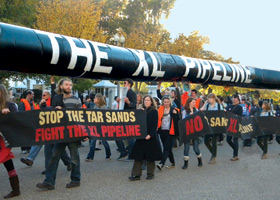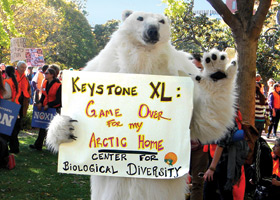Keystone XL Pipeline = Climate Catastrophe

Since November 2011, when thousands circled the White House in protest, the proposed Keystone XL (KXL) pipeline has emerged as a divisive issue in U.S. politics. In January, President Obama rejected the pipeline application from Canadian firm TransCanada, citing the need for further environmental review. By February Senate Republicans had added an amendment to a federal transportation bill that would speed up Keystone XL’s construction. Sound bites surrounding “energy independence,” “job security” and “environmental concerns” dominate discussions in TV ads, political rhetoric from congressional leaders and presidential candidates in media coverage of the protests.
Less prominent is reference to the pipeline as a major new investment ($7 billion) in fossil fuel infrastructure at the very time most scientific institutions and leading climatologists are releasing very clear warnings about the dangers of increasing global carbon dioxide (CO2) emissions. Dr. Fatih Birol, the chief economist of the International Energy Agency has said: “This significant increase in CO2 emissions and the locking in of future emissions due to infrastructure investments represent a serious setback to our hopes of limiting the global rise in temperature…”
Keystone’s Climate Change Problem
As historic global weather extremes coincide with documented declines in major ecosystems such as oceans, coral reefs, forests and Arctic sea ice, there are many who believe that the CO2 and climate change implications of the KXL should be at the forefront of public discussion.
After extracting the bitumen crude from one of the largest known untapped carbon reserves in the world, the KXL will transport the oil through six U.S. states to refineries and other end-users on the U.S. Gulf, where it will be processed for a wide range of petroleum-based services and products.
So how much CO2 will the KXL create? It’s not possible to say with certainty, but a number of industry, government and academic reports offer insight into the pipeline’s CO2 implications. Such as:

• KXL will transport 900,000 barrels of oil daily. It can be assumed that much of this will be processed into gasoline.
• KXL, at capacity, would thus lead to produc-tion of 19 million gallons of gasoline daily.
• When burned, this gasoline will produce 175,000 metric tons of CO2 per day for the next 18 years—equivalent to the emissions from 10 million cars annually.
• In total, KXL oil will produce more than 2 billion tons of CO2 over the course of the pipeline’s lifetime.
In short, KXL will add to an already dangerous accumulation of CO2. A report called The Critical Decade from the Climate Commission sums up the view of most climate scientists: “Humanity can emit not more than 1 trillion tonnes of CO2 between 2000 and 2050 to have a probability of about 75% of limiting temperature rise to 2°C or less. According to the latest data, between 2000 and 2010 we emitted approximately 300 billion tons of CO2, so after 20% of the allotted timeframe, we’re already over 30% of the way through the allotted emissions.”
Emissions and Impacts to Come
CO2 contributes to climate change because of the cumulative nature of its effects. The Oxford Institute for Energy Studies writes: “The cumulative and irreversible nature of CO2 implies that a significantly heavier weight should attach to current as opposed to future emissions (cap and trade). Policy making needs to redress this imbalance.”
KXL oil—in the form of bitumen—also emits more CO2 than conventional crude, because the extraction process is more complicated, requiring the sands to be steam heated and then diluted. And the pipeline would set a precedent for further tar sands oil development.
“If Keystone XL is approved it sends a signal to the oil industry that it’s ‘game on’ for tar sands expansion,” says Elizabeth Shope of the Natural Resources Defense Council. “That industry wants to expand tar sands production to 7.6 million barrels per day. The incremental (carbon) emissions from that would be 228 million metric tons of CO2”—equivalent to the emissions of 38 million cars per day.
Extracting oil from under the ground in Alberta would also require the destruction of hundreds of thousands of acres of Canadian boreal forest. This forest now stores 15%-30% of the world’s soil-based carbon. Development of the tar sands oil industry will fragment and erode this forest. Over 65,000 km2 of forest—the size of California’s Mojave desert—is already slated for destruction.
The contribution to climate change by tar sands oil is even likely to have detrimental effects on agriculture and world food supplies. The Center for Global Development, a nonpartisan research center, reported in October 2011 that Canadian tar sands extraction would “have a devastating effect on global food production, especially in climate-vulnerable continents such as Africa.”
The Industry Spin
The oil industry has minimized the CO2 and climate change significance of the KXL—and sometimes ignored it completely. TransCanada’s website contains many pages promoting the KXL, including a 500-word report titled “Protecting the Environment” in which the words “carbon,” “greenhouse gas” and “climate” never appear. Other KXL supporters have called the project “carbon neutral.” Bill Day, a spokesperson at Valero (the only American refining company contracted to process KXL oil to date) said: “Our Port Arthur [Texas] refinery has been processing heavy oil similar to Canadian crude for decades. Getting Canadian crude to Port Arthur would only replace one source of heavy crude with another, so no big carbon emissions gain there. And transporting crude via pipeline is much less carbon-intensive than transporting it by ship.” (TransCanada and the Prime Minister of Canada have both threatened to build a new pipeline to the Canadian Pacific coast, where it will then be exported to China and Asian markets, if the KXL is ultimately rejected in the U.S.).
The reasons why the pipeline’s CO2 and climate change implications have received little public attention are obvious to James Hansen, Ph.D., director of the NASA Goddard Center for Space Studies. “Look how difficult it was to fight against the tobacco companies,” he says. “They are puny compared with the fossil fuel special interests which permeate governments around the world.”
Political Considerations
Indeed, in September 2011 it was revealed that Paul Elliott, a lobbyist for TransCanada, was a former campaign advisor for Secretary of State Hillary Clinton, and that Clinton’s State Department was coaching Elliot on how to respond to KXL criticism—at the very time the agency was providing its required Environmental Impact Statement (EIS) on the KXL—a key element of the Obama administration’s consideration. Ultimately, the EIS was roundly criticized—including by the U.S. Environmental Protection Agency—for not addressing climate change implications properly. In October President Obama hired a former Trans-Canada lobbyist, Broderick Johnson, as a senior advisor to his 2012 campaign
Obama’s decision to reject approval for the pipeline indicates the industry’s influence on the executive branch may be waning. But KXL supporters in Congress have strong financial relationships with the oil industry, particularly Senate Minority leader Mitch McConnell and House Speaker John Boehner, the two leaders who have emerged in recent months as the most vocal congressional supporters of the project.
McConnell is the single largest recipient of campaign contributions from Exxon-Mobil in the U.S. Senate ($44,500 in 2011-2012); while Boehner, who in January pledged he “will continue to push this,” is the largest recipient in all of Congress from oil industry PACs, having received nearly half a million dollars in contributions from the oil and gas industries since he entered Congress. Other congresspeople with substantial contributions from the oil industry have taken up KXL as a highly emotional, rhetorical rallying cry. “I want to wake up talking about Keystone pipeline and I want to go to bed at night talking about Keystone pipeline,” said Representative Tim Griffin of Arkansas in January whose second-largest campaign donor is the oil and gas industry.
KXL has emerged as major political topic in the 2012 presidential campaign. Republican presidential candidates have blasted Obama for “killing” American jobs by rejecting the pipeline. In a televised debate on December 15, Newt Gingrich called Obama’s rejection of the pipeline “utterly irrational.” Defending his decision, Obama has cited the rushed timetable for a decision forced by Republican legislators, and has hinted that TransCanada may still reapply in the future if an alternative route through Nebraska is found.
Keeping Quiet on Climate
Despite its inclusion as a hot-button political issue, very little is being publicly discussed about KXL’s CO2 and climate change implications. But Raymond T. Pierrehumbert, Ph.D., a geophysics professor at the University of Chicago, says they can’t be ignored. “The fight over Keystone XL may be only a skirmish, but for those who seek to limit global warming, it is an important one,” he writes. “Turning down XL…draws a line in the oil sands, and affirms the principle that this carbon shall not pass into the atmosphere.”
In August, a group of scientists from the Carnegie Institution for Science, Stanford and Princeton universities and other academic and research institutes, wrote a letter to President Obama referring in urgent terms to the climate change implications of the KXL project. “When other huge oil fields or coal mines were opened in the past, we knew much less about the damage that the carbon they contained would do to the Earth’s climate system and to its oceans. Now that we do know, it’s imperative that we move quickly to alternate forms of energy—and that we leave the tar sands in the ground.”
Opening up the tar sands oil, they told the president, “will leave our children and grandchildren a climate system with consequences that are out of their control.”

